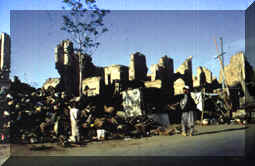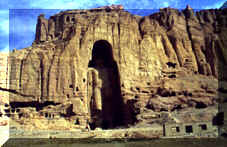|
| |

THE WEEK, India, Nov 26, 2000
THE FORBIDDEN
LAND
When an AK-47 is thrust into one's face, the most illogical
diktats of the Taliban appear reasonable. As the writer found out recently
By Sergio Trippodo/Kabul
The Order threw everything into confusion. Children stopped playing. They were
no longer allowed to smile. At every moment it was forbidden forbidden to enjoy life, to
joke, to laugh, to kiss each other in the groves. Forbidden, all what the Great Conqueror
disliked, was forbidden.
Afghan poet Said Bahaudin Majrouh
Now you can add the shaving cream
and razor to the list. Last fortnight, ordinary Afghans were drawn to a notice pasted on
the gates of various ministry buildings in Kabul. The word 'forbidden' was not used but
the message was clear: cut the morning shave out of the schedule. Men without a beard
would not be considered for jobs or provided any services by the government, said the
decree from the reclusive leader Mullah Mohammad Omar.
More than four years after it took over the country, the Taliban
is determined to push ahead with its agenda to make Afghanistan the world's
"purest" Islamic state. For the people who are used to the repressive diktats of
the Taliban, the latest decree is one more in a long list. After the capture of Kabul in
1996, the Taliban issued a slew of fatwas, the Islamic rules decided by the ulema or
scholars and implemented by the munkrat or religious police.
One of them is to 'prevent' music. Literally translated from the original text in
Dari language, the fatwa reads, "In shops, hotels, vehicles and rickshaws, cassettes
and music are prohibited. If a cassette is found, the vehicle and the driver will be
imprisoned. If five people guarantee, the vehicle will be released and the criminal
released later." Music and dance at wedding parties are 'prevented' too.
The Taliban has banned even Nawroz, the traditional Afghan New
Year festival as "anti-Islamic". Women are not allowed to work. Or go to a
tailor. Says fatwa number 14: "If women or fashion magazines are seen in the shop,
the tailor will be imprisoned." Only men can work. They earn a monthly salary of Rs
100 if they are lucky enough to have a job in Kabul. Farmers can till a stony field with a
simple shovel and risk starvation, or cultivate poppy.

Most of them go for the second option and produce opium, even if they have to work on
a terrain that hides 10 million landmines. Just a few kilometres from the border with
Pakistan, heads bob from the huge green expanse dotted with rose and white flowers. In
a few weeks, the rose poppies will give low-quality opium, which will be sold at
(Pakistani) Rs 1,400 per kg. The white ones will yield Rs 4,000 a kg. Farmer Ahmed knows
that his work is illegal, but says he has no other means to feed his family.
"When the UN or the Taliban give me an alternative, I'll be
glad to avoid spending ten hours a day under the hot sun. But this will never happen,
because those in Kabul earn much more than us in this deal." The Afghan opium
production in 1999 was 4,600 tonnes, nearly 120 per cent more than what was produced the
previous year. In fact, Afghanistan has now overtaken Myanmar and produces 75 per cent of
the world's opium.
That's good for the Taliban regime which generates some 60 per cent of its estimated
\\$100 million war budget from 'taxes' on smuggling and drugs trafficking. The clergy in
Kabul claims that "drugs produced in Afghanistan go to the kafirs in the west, and
consequently, do not harm the Islamic community".
Statistics from neighbouring countries give a different picture:
58 per cent of the produce is consumed in Central Asia. Pakistan, which did not know this
phenomenon till 1979, has five million addicts. Iran's official data for 1998 showed a
population of 1.2 million addicts; NGOs put the figure at over three million. Avisitor to
the 'forbidden' land learns about the restrictions the moment he applies for a visa at the
embassy in Islamabad. There is a notice for journalists, a special fatwa that forces a
reporter to notify the ministry of foreign affairs in Kabul on arrival, and to stay at the
gloomy Inter-Continental Hotel.
One can rent a car only from the Garzandoi—the former Afghan
Tour—which is now a state-run machinery of control. And since any visitor requires an
interpreter, one gets a guide-cum-spy from the government. It is strictly prohibited to
take pictures of any living being. Once in Kabul, the journalist learns that a living
being is also a goat or a camel, even a house because "human beings are living
inside".

The application for a permit to travel out of the capital takes a
few days. The application goes from the foreign office to the ministry of culture and back
to the foreign office, to the sub-section for foreign affairs in the ministry of culture,
then back to the foreign office where the permission is mostly denied. Luckily, in this
case the daily reports of the interpreter-spy do not show any irregularity in the
visitor's behaviour and a permission is granted.
A day-long ride on a bumpy apology of a road brings one to the
almost deserted town of Bamiyan, which boasts fabulous statues of the Buddha. The welcome
is cool: curfews, checkpoints every 200 metres, Toyota pick-ups with rockets ready to
shoot, mujahideen with their Kalashnikovs pointed at your face, wanting to know who you
are, why you have come. Just seconds after the first click of the camera, a roar emanates
from the feet of the buddha and black turbaned men run towards ME. A 14-year-old holds an
AK-47 at my face and shouts, "Photos are prohibited!" It is forbidden to stay
overnight in the only lodge in Bamiyan because it is run by a Shia while our Taliban guide
is a Sunni Pashtun who does not want to spend the night worrying about the safety of his
throat.
So, to protect the foreign journalist, it is deemed better to
stay at the Taliban HQ. It is safe I am told; only a few mortars have to be moved out of
the room, but "there is no danger as they have expired since long". Early next
morning the sunrise uncovers the beauty of the golden hills where the Buddhas have been
carved.
Just seconds after the first click of the camera, a roar emanates
from the feet of the Awakened and a group of furious black turbaned men run towards the
foreign infidel. A 14-year-old mujahideen holds an AK-47 at my face and shouts,
"Photos are prohibited!" My explanation that I hold a special permit signed by
Wakil Ahmed Muttawakil, the foreign minister and number two in the Taliban hierarchy, does
not impress him.
The commander, an 18-year-old, looks at the papers and delivers
his sentence: "OK, when all my boys will evacuate the military base inside the cave
of the Buddha, you will have ten minutes to shoot some pictures. Then you will leave and
go back to Kabul. Right?" One protests that the permission is for a whole day, but
pat comes the answer: "That's it! Ten minutes now, plus twelve hours by car to reach
Kabul, make a whole day. Right?" Facing an AK-47, the explanation seems extremely
logical.
Inside the metal wreck of a taxi, a tape-recorder is playing some
music: it's terrible yet much sweeter than the roar of the black knights of the Taliban.
| |
|

